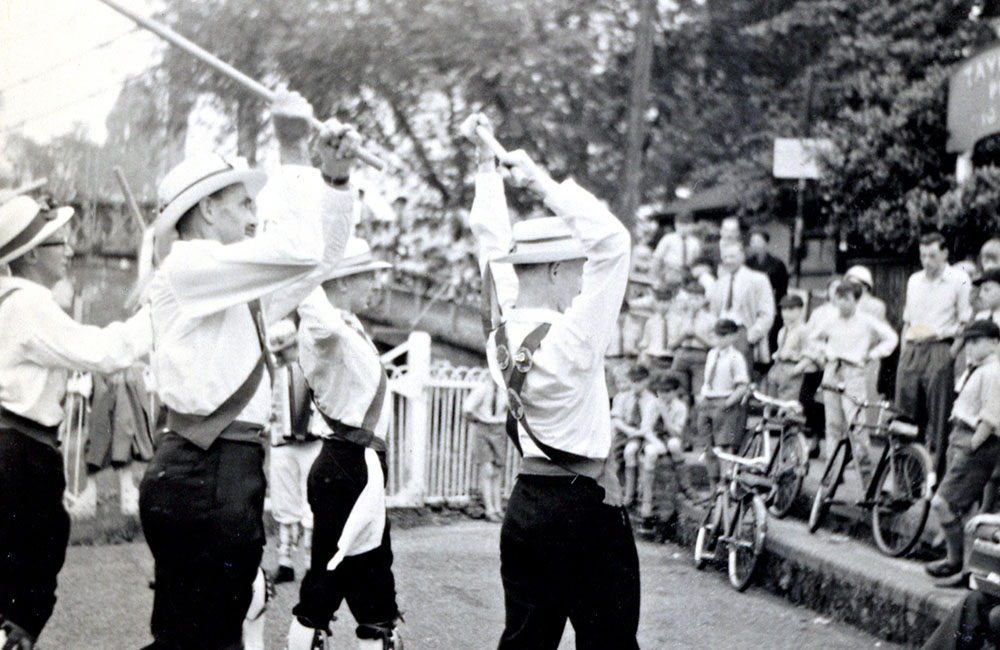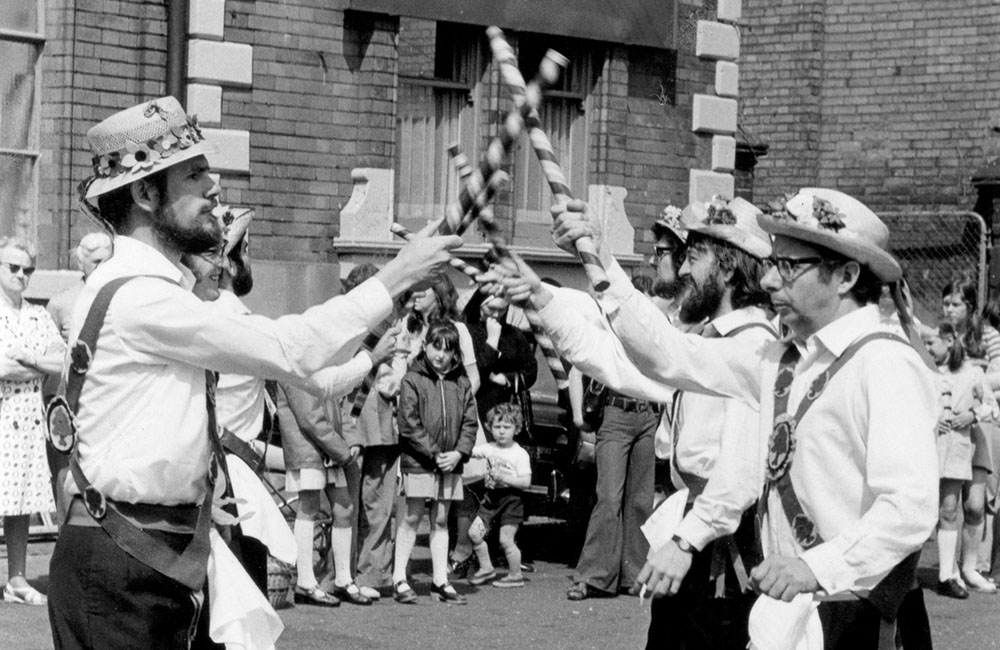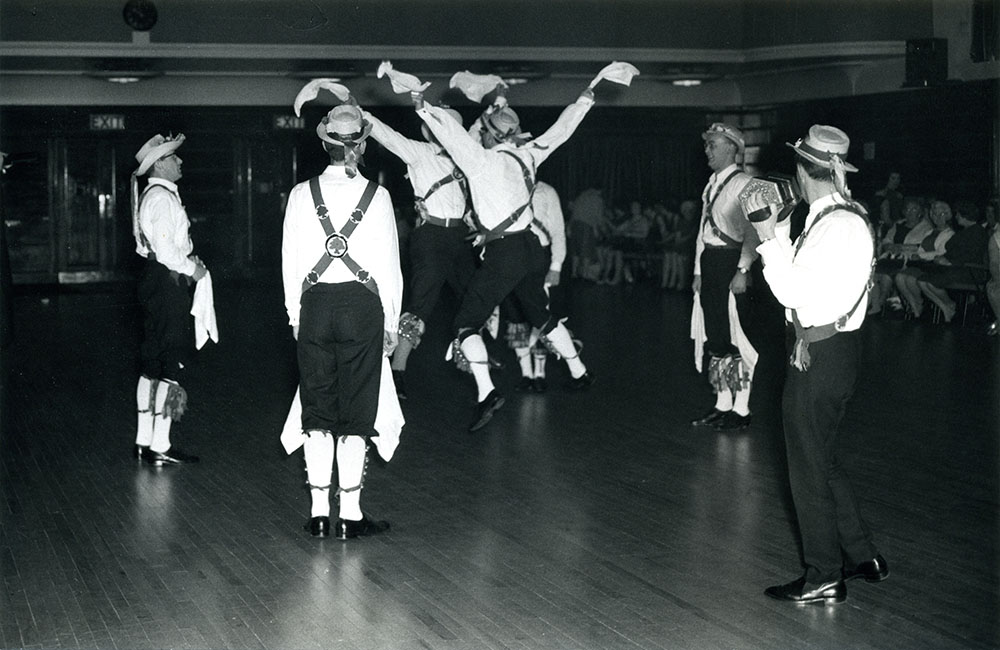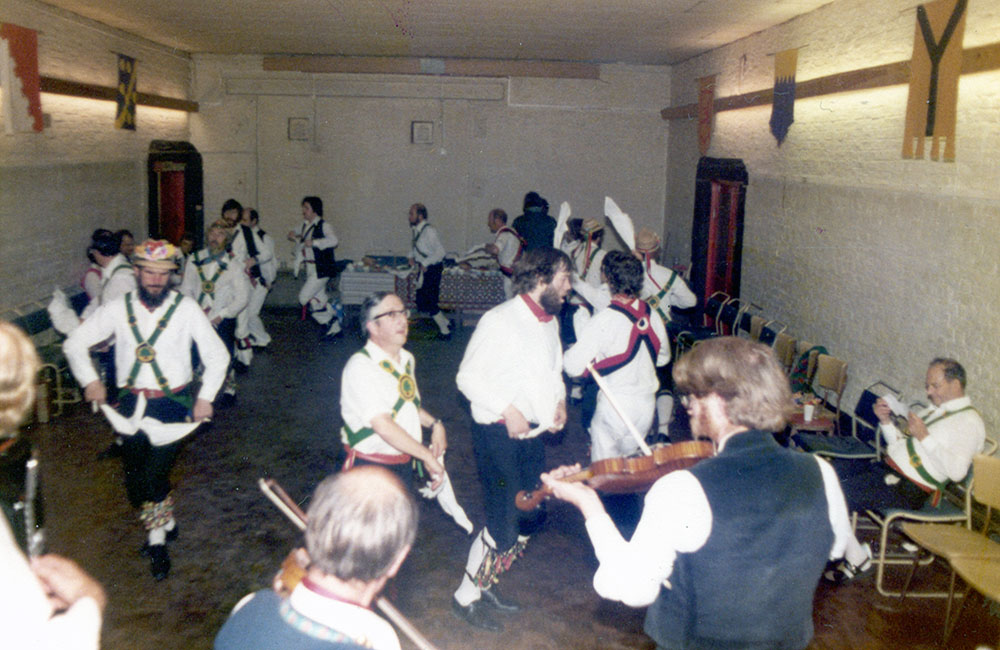All about Woodside Morris
Woodside's History
In the beginning...
On the Phoenix Folk Club's 1956 Whit Monday outing, the subject of a permanent and dedicated 'Morris and Sword' section was raised, not for the first time. On this occasion however, the discussion gave way to action, with Eddie Reavell taking on the task of putting the section together, looking for technical support and gathering together sufficient membership. Eddie would later go on to become the section's Squire.
An excerpt from the first Bagman's report in July 1957
WOODSIDE MORRIS MEN - Bagman's Report:
Just over a year ago, on the Phoenix club's Whit Monday outing, Eddie Reavell agreed to help with the formation of a Morris and sword section. Meetings started the following September and one year later - on September 21st - the woodside Morris Men hope to make their first appearance at a Morris Ring Meeting at Kingston. For part of the year, we have been lucky to have Bert cleaver with us, and under his guidance as squire the Morris and sword secton has grown into a fully constituted Morris club. It is with real regret that we say goodbye to Bert as he leaves to take up a new post in Gloucester. Eddie Reavell has taken over as squire of the Morris Men.
The Early Years - Finchley
Once Eddie had put the bones of the section together, practice meetings could begin. To provide help in forming and training the section's new repertoire, the now legendary authority on Morris Dance, Bert Cleaver, was appointed Squire, and in September of 1956, he took charge of the club's first meeting.
Although the section was intended to remain a part of Phoenix Folk Club, with members initially drawn exclusively from the parent organisations own ranks, it was decided that it would be given its own name and identity. As the Phoenix Club met at a school in Woodside Park, Finchley, it was decided to name the new Morris section after that area, and a kit was designed to reflect that choice, with an original design being produced for the rosettes decorating the baldricks. Though still a part of the Phoenix club, Woodside Morris Men had become, to all intents and purposes, its own entity, with its own constitution and officers.
Bert remained Squire for the best part of the year that followed, leaving in the summer of 1957 to move to Gloucestershire; it was at this time that Eddie Reavell took over as Squire. And so it came to be that, on Saturday 21 September 1957, at the 61st meeting of the Morris Ring, hosted by Thames Valley Morris Men, and based at Kingston, Woodside Morris Men were ready to make their first official appearance.

1957 Thames Valley Morris Men Ring Meeting, Teddington Lock, Teddington
copyright 1957 Woodside Morris Men
The club's early years saw it develop relationships with a number of other London clubs, such as Westminster and Hammersmith, with dancing out tending to be at specific events, or weekend tours, and even the odd Wednesday night tour of pubs. Yearly visits were made to Kent, where Woodside would tour around Dover, Hastings, Deal, etc., with other clubs.
Woodside were also a regular feature at many Ring Feasts, which were hosted and attended by sides from all over the country, and consisted of a day of dance, with an evening of feasting and dancing.
Relocating - Watford
By 1965, links with the parent folk club were more or less broken, and in March that year a letter was sent to members informing them that next Wednesday’s meeting would be taking place at the Railway Club in Watford. Of course, this was only a temporary arrangement, and the letter reassured everyone that Finchley would remain the Club’s base.
By July however, Watford had become Woodside’s new home; an arrangement made possible through one of the Woodside men being a member of the British Rail Social Club. Initially this didn’t have much effect on the Club’s activities, but soon Feasts and other events started to gravitate towards the Watford, Hemel and Rickmansworth area.

1974 Derby Day of Dance, Town Centre, Derby
copyright 1974 Woodside Morris Men
Crisis and Regeneration
In the early 1970s, Woodside faced a number of dilemmas which, for a while, threatened the club’s very existence. First of all, the Railway Club chucked them out, when it was discovered that Woodside’s railway man had moved away some considerable time ago. For a while, the Club tried a number of other venues, including Chayter School and the Red Lion at Apsley, but by 1973 the Club reached its lowest ebb. Throughout the whole of that year, the Club only met on one occasion, the AGM, and in that time it was only the will of a number of key members that kept the side together.
Circumstances soon came to the rescue though. Back in Watford, the Pump House Arts Centre was being developed, and one of its main purposes was to provide accommodation for clubs such as Woodside. With the prospect of finding a new home, Woodside members became active in preparing the Pump House for opening, and also built a relationship with members of the Pump House Folk Club. Within a few years, Woodside had gone from near extinction to having possibly the strongest membership in the club's history.
During this ‘revival’ period, Woodside started to dance more regularly at local pubs. As with now, the backbone of the side ’s year consisted of Wednesday night practice in winter, and Wednesday night pub tours in the summer. All seemed to be going swimmingly, but then a split occurred that saw a large number of members move on to form a separate Morris side.

1967 Unknown event, Town Hall Assembly Rooms, Watford
copyright 1967 Woodside Morris Men
'The Split'
The general Morris revival during the 70s was very much generated through an explosion in the number of women’s teams dancing. The families involved with Woodside included a number of women dancers who had formed a side and the two teams regularly danced together at events. Problems arose, however, when Woodside held their annual Feast, or Ale.
Traditionally, Woodside had always opened their Ale up to other members of the Morris Ring, an association of male Morris clubs. Most members of the club wanted the Ale to remain in this format, meaning that women’s or mixed teams were not able to attend. These days, having a single sex club of either gender is not seen as an attempt to suppress the other, but at that time, when radical feminism and the reactionary response it engendered were equally insensitive to the mainstream majority, otherwise unconcerned bystanders could find themselves drawn into a quarrel that's purpose was more political than benevolent. As a result, a picket line appeared at Woodside's 1984 feast, with disaffected members of the club, their wives and other women protesters in attendance. Eventually, following a special meeting, a number of members chose to leave Woodside and form Phoenix Morris: initially an all-male side but now dancing as a mixed side, based in Rickmansworth. Thankfully for Woodside, the overall membership was strong enough to absorb the loss, and within a few years membership was back to healthy levels.
Feet Under the Table
In the late 70s and early 80s, Woodside developed relationships with a number of local teams, such as the women's Northwest Clog sides, Whitethorn and Flowers of May, and the now defunct men's clog side, Old Bull. A number of members of Old Bull also danced or played with Woodside. Switching from a yearly day of dance to an evening Ale Night also helped develop closer ties with local Cotswold sides, such as Grand Union, Aldbury and Towersey.
In the mid 1980s, the side started on a tradition that is still one of our most popular annual events: the weekend away. Although the side are often involved in weekend events, the weekend away is organised purely for the team's own enjoyment, along with their families.
In the last ten years, the side has broadened its horizons further, becoming involved in festivals and events across the country (and Europe!). The Mummers Play has recently been revived, and the side is as busy as ever, with local and touring events, school and club involvement, encouraging the continuation of England’s folk tradition.

1979 Woodside Ale Night, The Pump House, Watford
copyright 1979 Woodside Morris Men


